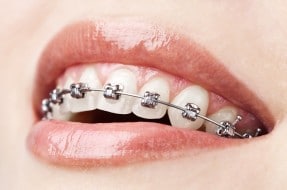Call now on0800 051 8069
Brace yourself for straight teeth
-
This blog discusses some of the different types of braces and the problems that can occur with braces.
With the quest for straight teeth many people opt to have braces to improve or change their smile. However, there are different types of braces available and it is important that oral hygiene is maintained throughout the treatment.
Types of braces
Metal braces – these are the traditional style braces with metal wires and brackets. These braces are fixed and cannot be removed by the patient, but they tend to be less expensive.
Ceramic braces – these are similar to metal braces, but the brackets are tooth coloured and therefore blend with the colour of a person’s teeth to make the brace less noticeable. In some cases, the wire can also be tooth coloured to make the brace much less visible. These braces tend to be more expensive than the traditional style metal brace.
Lingual braces – these braces are the same as the metal braces, but instead the braces are fixed onto the inside of the mouth and therefore the brace will not be visible but this brace will be more expensive.
Invisalign – these braces are virtually invisible and consist of custom made plastic retainers. There are no metal wires or brackets and this may make them a lot more comfortable for the patient. However, they cost significantly more than traditional style braces.
Benefits of a brace
– Improve the appearance of teeth and a person’s face
– Correct any bite problems
– Can improve the health of gums and teeth
Problems that can occur with braces
It is important that when a brace is fitted, extra care should be taken with oral heath. Wearing a brace can make it more difficult to brush teeth and the advice of the treating practitioner should be taken.
It is also important to limit the amount of sugary snacks and drinks.
If oral hygiene is not maintained the following problems can occur:
– Swelling and bleeding of gums that can cause lasting damage
– Damaged teeth as a result of not brushing appropriately. This can take the form of permanent white or brown marks, or in some instances can be severe and teeth may require extraction due to decay.
Other problems can also occur which are not related to oral hygiene, such as:
– A relapse, where the teeth return to their original position, this may be because the treatment was too quick or not suitable for that particular patient.
– Having to undergo further treatment as certain teeth were not extracted prior to starting the original treatment.
Getting a brace
Any dentist can carry out orthodontics provided they feel competent to do so. However, orthodontic treatment is a specialised area and only those dentists who are registered on the orthodontic specialist list with the General Dental Council, can call themselves a specialist orthodontist.
For those considering orthodontic work, you should ensure that you seek appropriate advice when deciding to get a brace, and should attend a consultation with an orthodontist or a specialist equipped with the experience and expertise to carry out orthodontic work.
A treatment plan should be devised and you should be advised of your options, what the treatment will involve and the cost.
If you have suffered problems with a brace, which you feel could have been avoided, please call the Dental Negligence Team who will be happy to assist.







